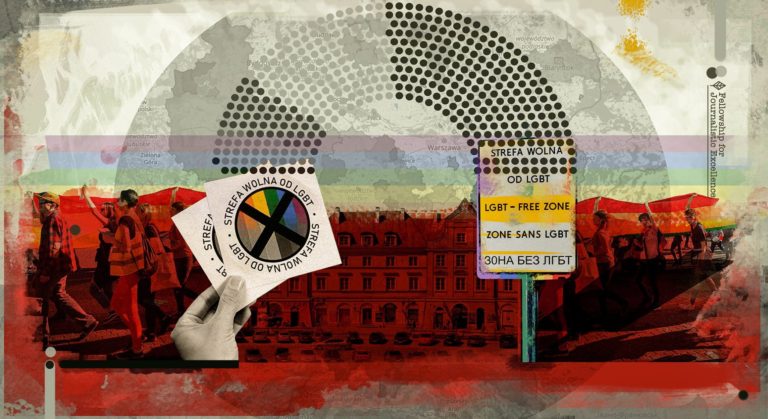

Poland decriminalised homosexuality in 1932, becoming one of the first countries in the world to do so. Popular attitudes towards openly gay and lesbian people have, however, been heavily shaped by the powerful Catholic church, which has been fiercely critical of non-heterosexual relationships.
In the 30 years since the collapse of communism, the clergy have taken a more assertive role in public life. Over the same period, Poland’s integration into the European Union has exposed the country to new international norms and demands for the equal treatment of sexual minorities. An increasingly visible campaign for LGBT rights has coalesced around calls for the legal recognition of same-sex unions and for sex education in schools to include discussion of discrimination and non-heterosexual relationships.
The declarations adopted by local governments are widely interpreted as a rejection of these demands. The impact of these declarations on LGBT life lies at the heart of the debate over the zones.
There is anecdotal evidence of an uptick in homophobic aggression since the declarations were passed, with violent counter-protests accompanying the Equality Marches in Lublin and Bialystok in 2019. However, it is impossible to establish the extent to which this violence is a direct result of the declarations versus, for instance, the broader climate of hostility to LGBT people fostered by the government. There are no official data on homophobic attacks as Polish law does not recognise these crimes as a distinct category.
Milosz Zawistowski has glimpsed the face of homophobia in his city. Three years ago, he went with his mother to Lublin’s first Equality March – the Polish version of Pride – only to be hemmed in by rioting football hooligans and far-right protesters. The police eventually secured the route, making some 20 arrests, and the parade went ahead.
He would march again the following year, after the region had earned the “LGBT-free zone” label. This time, the route of the parade seemed better secured, and the hooligans were kept well at bay by riot police. But the danger was arguably greater. Among the dozens of rioters arrested that day were a married couple, carrying a rucksack full of firecrackers taped to cans of lighter fluid – crude, homemade explosive devices.
The couple was in their twenties, the man was a gas-fitter by trade, the woman unemployed. At their trial, experts testified that the explosives, although crude, could have been deadly if deployed as intended, against the marchers. The male defendant offered an explanation for his actions: “I am for Poles and for family. For me, family values are a boy and girl.”
Milosz told BIRN that he had not ruled out relocating to Warsaw. He added, however, that if he were to ever make the move, it would have nothing to do with his sexuality. “My orientation neither helps nor hinders me here,” he said. “I am not fighting for anything but nor am I hiding very much.”
Warsaw appeals to him as it appeals to the youth of provincial cities all over Poland – it has a thriving job market. “I am sick of standing behind the bar,” he said. “And there is simply no other job here for someone like me.”
Haphazard process
The term, “LGBT-free zone”, entered Polish political discourse as a crass marketing stunt. In July 2019, the slogan was featured on a free sticker given away with the weekly edition of Gazeta Polska, a pro-government tabloid known for its ultra-conservative, nationalist stance.
The illustration on the stickers featured the colours of the rainbow crossed out – an apparent riposte to the rainbow-flag stickers commonly displayed by LGBT-friendly venues. The sticker campaign provoked an outcry and was swiftly banned in a lawsuit brought by an LGBT activist, Bart Staszewski. Gazeta Polska responded to the lawsuit with a fresh sticker campaign bearing a new slogan: “LGBT-ideology free zone”.